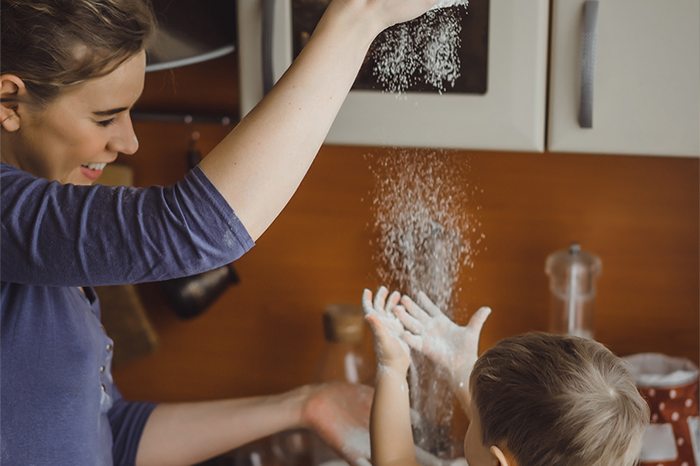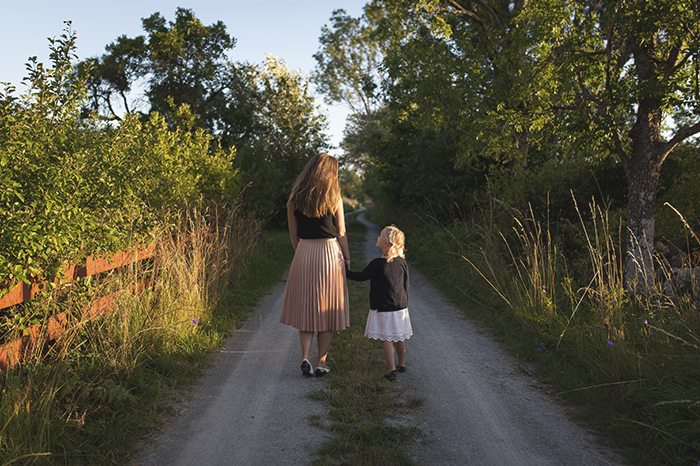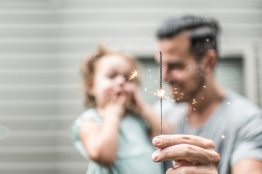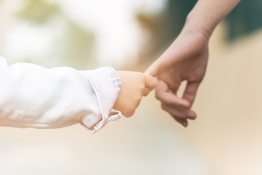You both attended the Liszt Academy’s class for outstandingly talented students from the age of 12, and I think you both sat together. When did this transform into love?
Barnabás: “At the age of 12 I think we just teased each other, as is normal at this age, and then we both had older friends and girlfriends.”
Kati: “I had a serious platonic relationship but I found myself to be less and less happy with it.”
Barnabás: “…all that remained of passion was suffering.”
Kati: “I remember that my mother told me not to hang around the house and to get off to Keszthely because Dénes Zsigmondy was holding a masterclass, besides which Barnabás Kelemen was also there and I could at least hear him play the violin. In Keszthely, I contacted him to ask whether he could get me into the classes because I was not officially registered. Then we had a whole week to chat and that was enough for me to realize: he will be my husband.”
Barnabás: “When we travelled back home on the bus, we were already talking about the names of our future children. A few months ago we went to Keszthely mansion with the children and showed them those places where we had spent that week on the masterclass, and where our first kiss had happened.”
Barnabás shows the picture of Kati taken in Keszthely 20 years ago (he has it scanned into his telephone), then the recent photo in the mansion where they are all smiling as a three-child family – Hanna and Gazsi visible, their little sister still hidden.
How old were you when you started planning to have children?
Barnabás: “I was 18, Kati was not even that. I was six months older, luckily, because that was important for Kati.”
Kati: “Rather, stability was important so that I could feel secure. I wasn’t looking for that type of boy who was a bit of a handful. My father and mother fell in love when they were very young, my father is extremely family-centric, he was 15 when he told my mother that she would be his wife. I had been looking for my partner my whole life and Barnabás was my first serious relationship. And it was also important that I could look up to him.”
Barnabás:
“It’s important that we pull each other up. In love, in friendship, and in the teacher-student relationship.
“I, too, was seriously seeking a wife, before Kati I had never had a girlfriend I planned to spend my life with, but finally I saw that this could happen with Kati. In kindergarten, I wanted to have six children, three boys, and three girls.”
Kati: “A long time ago, when parents planned the marriages, they frequently chose very well (except when, for example, financial considerations came to the fore). Nobody knows a child better than the parent.”
Are you thinking that your mother deliberately sent you to Keszthely?
Kati: “In the end, yes… In this story, the family is important. We come from very similar families. Musician and teacher parents, furthermore, from among our grandparents there were farm labourers, so we also know what hard work is and hardship.
“We had so many things in common that we could build our lives on one another in all areas. As I saw in the case of my parents.”
Were they your role models?
Kati: “Yes. Not only my parents but my grandmother, too. At 80, she is still the grand dame of Pécs to this day, to whom ladies go for aerobics, tennis, skiing, not only for the exercise but her wisdom and advice. She is virtually a psychologist for her students.”
Barnabás: “Kati has a very close relationship with her mother and grandmother.”
Kati: “I always felt that if I wanted to do something that would shame me in their eyes, it would be better not to do it. They sense if I have a problem, the telephone sometimes rings immediately at those times. They have guided me my whole life. When at the age of 12 I moved to Pest so I could attend the class of Ferenc Halász at the Liszt Academy, the start of college residence living represented the same as suddenly becoming an adult.”
Barnabás: “And at that time, there was not a lot of positive news about the halls of residence of the ballet school.”
Kati: “There was a great atmosphere, I still love the world of dancers. However, generally those who deal with the body from a young age live this with a sort of naturalness in their private life as well. At that time there was not even a telephone but my parents placed complete trust in me so it didn’t even occur to me not to live up to this trust.”
Barnabás: “I, too, regularly bless the rigour of my parents. I have just come back from a tour where I played Bartók’s violin concerto every day over three days, meanwhile in the afternoon I was teaching my students who came there from Cologne, and I was preparing the Shostakovich violin concerto that I will play. The only way I could do this is by going back to that Bartók violin concerto I studied at the age of 20 with my parents and with my Liszt Academy teacher Eszter Perényi for an entire year. Without them I would not be here and I would not have a repertoire that allows me to live such a life. The routine makes it possible to learn a Szymanowski or Penderecki violin concerto very quickly but they are not embedded so deeply in me. I think that I wouldn’t be able to perform these in the same way in ten years’ time.”
Kati: “This is a bit like microwaving: things heat up fast, but cool down fast. However, if you cook something for a long time in an oven, it retains the heat longer. In fact, I could similarly perform the Bartók violin concerto at any time with just a little practice.”
Barnabás: “You learnt it because of me.”
Do you learn pieces for each other’s sake?
Barnabás: “We teach each other, and learn from each other.”
Kati: “Barnabás is the most important critic and his opinion is most important for me. But the fact is that an outsider in whom you trust is important. On the other hand, you have to be very careful when, what and how you say something. It took us a few years before we had learnt this in relation to each other. A person – primarily immediately after giving concerts – is very fragile.”
Barnabás: “Sometimes the smallest twig you throw on the fire can immediately flare up.”
Kati: “I would say that Barnabás practices astoundingly. Faultless even from the very first play. He is always in the same collected state and is only happy once he has completed his daily practice, even in summer if we are on holiday. My mood and my current state of enthusiasm are always very apparent in my practice sessions. I am rhapsodic.”
Barnabás: “That’s going a bit far, obviously I don’t feel myself to be perfect at the first go. But I also teach my students that it is necessary to practice concert intensity, this cannot be done in arrears.”
And when the benefit, the endorphins, the success kick in?
Barnabás: “During the concert itself I sense with 98% certainty how the audience will react. That kind of endorphin, or let’s rather call it uplift, starts during the preparation and keeps going during and after the performance. If the concert proves to be a success, then afterwards one gets a sense of relief and this good feeling lasts until it is time to sleep. Now, for example, I still feel the concert tour exhausting-uplifting effect. I simply don’t understand how it is possible for some people to give 150 concerts a year over many years with just a fortnight’s break! I had to share out my energy over just these three days. I couldn’t give everything of myself at the first occasion, and not only because of the audience but for the orchestra, too, I could not be the same person who they heard play on the previous evening.
“A major London-based management company put the question to me of how many concerts I would like. Many great artists jump at a hundred, whereas I felt happy with fifty.”
Kati: “‘Success’ is not the goal. Discovering the brilliant world of composers, understanding, experiencing their thinking and emotions… this gives the most profound joy also while dealing with works at home. And to finally share this with an audience desiring to know this is true pleasure. The joy of giving. But in the end, we don’t give ourselves... we are merely channels, media.
“Career is another story: I could have longed to play solo in the biggest concert halls of the world. When at the age of 23 I won the Szigeti József International Violin Competition, in the same week Barnabás won his most important competition in America, and Hanna was born two weeks later.
“I felt that I had made my mark, I was recognized in the profession, it is possible to come back to this but family is the most important.
“If the desire for a soloist career had been just a little bit stronger in me, that would have been the opportunity had I thought about the important things in life in a completely different way. But I never sought the lonely glitter. I experienced that I could be at the head of good orchestras on many occasions and I could also play the majority of concertos many times. But for me, my family came first, the life of a soloist cannot bear compromise. My husband also needs my support.”
Barnabás: “I remember that once Kati went for a Tchaikovsky tour with a Taiwanese orchestra and she suffered a lot.”
Kati: “I cried a lot every evening. Hanna was perhaps two, she stayed with my parents in Kaposvár and Barnabás was touring on the other side of the world.”
I read that you were loaned a Stradivari violin. Is it still with you?
Kati: “I was happy to play on it for a few years. It had a superb tone. I don’t know what has happened to it since because I had to return it suddenly without any reason. It was very unexpected because suddenly I found myself without an instrument although there were important concerts coming up. However, I found a serviceable violin in the range of state instruments, this is a Testore master instrument that I could take home with me. But it had a dead tone. I took it to a cimbalom player who builds violins. He set up the soul of the violin in just a few minutes (a small wooden sound post between the two sides) and then he moved this a few hundredths of a millimeter and... its true sound came out! I still play on this, it is one year older than my Stradivari.
“But I can say that I was playing on a very nice Stradivari violin with the sound of Queen of the Night for five years. I am grateful for this opportunity.”
If you were forced to choose between podium or teaching, which would you go for?
Barnabás: “One presupposes the other. For example, at Cologne University the Russian concertmaster of the orchestra wants to learn the Bartók violin concerto from me because he heard me playing.”
Kati: “Teaching changes the way I play and while practicing I often consider how a piece should be taught. I couldn’t develop as a teacher if I wasn’t present on stage. My real dream is a musical salon, where – even if there were only 20 people in the audience – we plan masterclasses and gatherings including talks, music, and readings in a family-style, intimate atmosphere. This together with teaching would completely satisfy me. I am passionate about teaching. I am happy if I can give, I am very interested in the different ways I can give my students wings, their enthusiasm has an impact on me as well.
“I would like them to realize that things are simple, all that is needed is to discover the key, playing and dealing with music is the greatest happiness.”
Barnabás: “It is interesting that at the Liszt Academy, the word was that Kati was very strict but in general her students were pleasantly surprised after two months.”
Kati: “It is true that those who come to me want to be driven. It happened that I had to give up on somebody, not as a punishment or because I was fed up with them, but because I thought that another teacher could get more out of them.”
Gazsi also wants to be a violinist. How strict do you have to be with him?
Kati: “He wants to be a ‘violinist footballer’. He is now at that age when we think more serious practising can start. In many Asian countries, they start to train children at the age of three or four, when they don’t wish themselves to do this. So far, Gazsi didn’t practice in any summer break, he only kicked a ball around and was happy. We reckon that the European education can make up for this disadvantage by the age of 18-20 and no childhood is lost this way. If somebody starts to play the violin seriously, it means a minimum two hours practising a day even when young.”
In what does Gazsi look up to his father most?
Barnabás: “Today, he received me by saying, Dad, I was at the barber and my hair is just like yours. Of course, what he most wants to resemble me in is playing the violin. We planted this desire in him as well because he heard his great grandfather, my grandfather Pali Pertis on a video recording, whose father was himself similarly a violinist. He likes Gypsy music as well, but if he plays folk music with Szalonna and orchestra he is very happy too.”
Kati: “But it is classical music that he most wants to play. It is important what Dad says when he plays what he has just learnt. It is very important how one reacts at this time. One has to give praise but also improve. Aunt Éva, Gazsi’s fantastic violin teacher, is the greatest help in this matter; we also learn a lot from her at my son’s violin classes.”
Recently you decided that your children would be private students. Because of Gazsi?
Kati: “Both of my children clearly pointed out what they needed. Hanna came to me saying, Mum, you are not paying attention, you hardly talk to me. Do you have time to lie next to me and have a chat? Frequently we are playing with Barnabás until 9.30 pm or we are not in Hungary for one or two weeks.
“At such times, my father and mother always provided that family energy the children needed. Without them, this family could not exist like it does. They moved to Budapest just because of this 4-5 years ago.
“Gazsi is taken to football training by the other grandfather and his partner three times a week and this is also a huge help. This all worked but I saw that when Hanna came back from school she was tired and it was not a good tiredness. I didn’t see that learning was inspiring her and making her happy, that she wanted to go to school, although this is a school with a good reputation. I was worried. It is not good when a person doesn’t like to study and develop. Something must change. It also hurt that the two siblings go to school in the morning, they learn separately, they attend extra classes and they only come home late in the evening. They don’t see each other and thus childhood passes, only teasing each other in the evening when they are tired out. Now or never – these years cannot be brought back!
“When I was 16, I won a four-year scholarship to Canada to study under Lóránd Fenyves. At that time, my little sister Dóra was born. I thought it would be impossible for my sister to be introduced to me at the age of four years! Instead, I returned earlier and we brought her up together with my parents and my younger brother, we played music with her, teaching her. She was involved in bringing up my children in the same way. Hanna and Gazsi have been private students for two weeks. A marvellous teacher comes to us and tutors them. I can already see that this overloaded fatigue and depression have disappeared. When I told them what I wanted to do, Hanna was very grateful. She asked me: seriously, will you do this for me? Hanna is interested in jazz, pop music, she composes, writes books, sings, and studies theatrical improvization. She plays piano but does not want to be a pianist. When she first revealed that although she had won a national piano competition she would rather have an animal farm with a huge estate, she was a bit nervous about what our response would be, but we told her, no problem.
“Only those should be allowed to play music beyond amateur level who do it from passion.”
What did Gazsi think of private studying?
Kati: “He goes in to school for gym classes, he doesn’t want to miss them, and this required an affectionate attitude and the permission of the school and Gazsi’s teachers. Practising is much easier for him as well this way, he can even come to see me at the Liszt Academy when I am teaching. To a certain extent, I have brought them back to the nest. I also spend more time at home and now that the baby is coming, I will have fewer concerts anyway. We wouldn’t like to separate them from their own friends, society, but we all need this now. It is possible that we will spend a year with them in Cologne so that they can learn another language, experience another type of mentality, and can learn what home and homeland mean. One can only truly see this when one is viewing it from a distance...”
Are you preparing for Christmas?
Kati: “At Christmas we are all together, my grandmother, my father, my mother, last year her sibling was also with us together with their family, my younger brother and wife with two children, my younger sister with her partner, whose mother will also come this year, indeed her cousins as well. Unfortunately, my husband’s mother died a few years ago but we have a fantastic step-granny, Marcsi. We always make our own presents with the children, this is the programme at home during Advent. Shopping is just stressful, of course the children also always receive some presents we buy, but doing handicrafts together is a lasting experience. I have already bought the basic materials for this year, last year we worked with glass, I cannot tell you what we are doing this year because it is a surprise.”
Meanwhile, the head of the family orders dinner over the phone and then he gets everyone moving – although the children have made themselves at home in the studio, even Gazsi would like to stay because he has made friends with the son of the photographer, Laci Emmer. But Barnabás came straight here from the airport and it is already past nine at night. It is just like a family beginning to pack up after an enjoyable visit on a Saturday evening. As they gather together suitcases, violins and a dog, it once again comes to my mind that despite their enormous talent and Bohemian attitude, how naturally everything went and in what a cheerful mood they were. Just like in an orchestra where different personalities play according to their own inner laws while paying attention and reacting to the other’s tiny vibrations at every moment.




